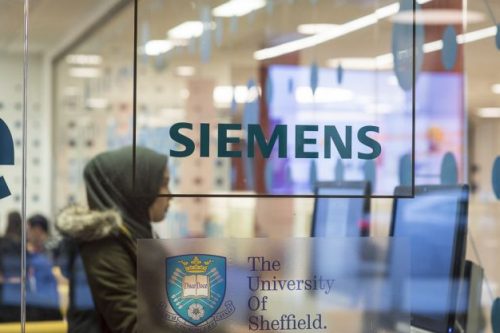University chosen to be Siemens’ top tier innovation partner

Global technology giant Siemens has selected the University of Sheffield to be in its top tier of innovation partners, as part of its new global research and innovation ecosystems.
The new Research and Innovation Ecosystems (RIE) have seen Siemens evolve its strategic engagement programme with universities to include, for the first time, seven UK universities in its top tier of innovation partnerships.
These include the universities of Sheffield, Birmingham, Cambridge, Manchester, Nottingham, Oxford and Newcastle University.
Made up of 16 regions around the world, two of which are in the UK, each ecosystem includes universities, Siemens companies, research institutes, catapult centres, innovation start-ups, creative individuals, business partners and customers, all collaborating to create, scale, and deliver ground-breaking technologies and services to market in the shortest possible time.
The seven UK universities have been selected because they share Siemens’ core interests in digital industries, smart infrastructure, eMobility, and core technologies, and they have been assessed as being in the top 10 leading global institutions for one or more of the fields of interest to Siemens for collaboration.
Sheffield’s research remit in the new ecosystems will be around the future of manufacturing.
Carl Ennis, CEO of Siemens UK, said: “This is an important recognition by our global business that UK universities have a lot to offer in innovation, ingenuity and creativity.
“These universities have demonstrated that they are more than capable of leading and participating in collaborative projects locally and globally.”
University of Sheffield has a longstanding relationship with Siemens, which has seen it partner with the company on a range of projects to develop pioneering solutions for some of the biggest challenges facing the UK and the rest of the world.
Since 2009, researchers from the university’s Department of Electronic and Electrical Engineering have been collaborating with Siemens Gamesa to develop the most reliable, innovative and efficient wind turbine generators.
The blockage predictor tool can help to prevent sewers from backing up during heavy rainfall, which could flood homes, gardens and rivers with wastewater.
Professor Jim Litster, vice-president for engineering at the University of Sheffield, said: “For the University of Sheffield, the Siemens partnership provides a great opportunity to connect with real manufacturing operations where our academic work can make a real difference.
“Our partnership is deep and well established, and this news demonstrates the University of Sheffield’s commitment to collaborate closely to advance global research and innovation.
“We have one of the largest cohorts of engineering students in the UK with over 6,700 students and through this partnership with Siemens our students have been able to put what they learn in the lecture theatre into practice.”







